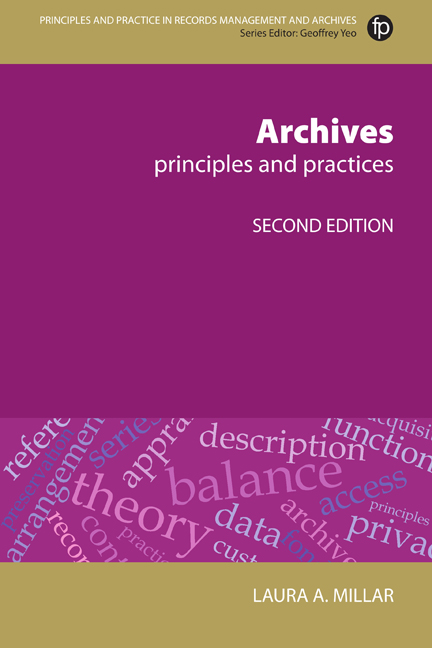Book contents
- Frontmatter
- Contents
- Figures and tables
- Foreword to the first edition
- Foreword to the second edition
- Acknowledgements
- Introduction to the second edition
- PART I ARCHIVAL PRINCIPLES
- 1 What are archives?
- 2 The nature of archives
- 3 Archival history and theory
- 4 The uses of archives
- 5 Types of archival institution
- 6 The principles of archival service
- 7 Balancing access and privacy
- PART II ARCHIVAL PRACTICES
- Conclusion
- To learn more
- Glossary of terms
- Index
- Miscellaneous Endmatter
5 - Types of archival institution
from PART I - ARCHIVAL PRINCIPLES
Published online by Cambridge University Press: 08 June 2018
- Frontmatter
- Contents
- Figures and tables
- Foreword to the first edition
- Foreword to the second edition
- Acknowledgements
- Introduction to the second edition
- PART I ARCHIVAL PRINCIPLES
- 1 What are archives?
- 2 The nature of archives
- 3 Archival history and theory
- 4 The uses of archives
- 5 Types of archival institution
- 6 The principles of archival service
- 7 Balancing access and privacy
- PART II ARCHIVAL PRACTICES
- Conclusion
- To learn more
- Glossary of terms
- Index
- Miscellaneous Endmatter
Summary
Wise and prudent men have long known that in a changing world worthy institutions can be conserved only by adjusting them to the changing time.
Franklin D. Roosevelt (1882–1945) Address at the Democratic State Convention, Syracuse, New York, 29 September 1936Today, archival institutions can be found in virtually every corner of the world, from governments, universities, corporations and clubs to historical societies, religious organizations, political groups and co-operatives. There are over 1000 self-proclaimed archival institutions in Canada, thousands in the USA and countless more around the globe. These institutions have been established to serve the needs of their society, and they are governed by the laws, cultures and priorities of that society.
Too often, archivists attempt to categorize archival institutions in relation to administrative placement rather than scope of service. For example, archivists might distinguish between church archives, government archives and university archives. But this approach does not account for the fact that one government archives might only manage the records of that government, while another government archives might also acquire private papers, or that one university archives cares only for its institutional records while another university archives has a broad responsibility for acquiring and preserving manuscripts and special collections. Ultimately, archival institutions will always represent whatever their society decides they should represent. Therefore, a more useful way to understand the different ‘types’ of institution that might exist in different societies is to focus on the services they might provide rather than on the adjective attached to the name: church archives versus special collections department versus business archives.
A distinction can be made at the start between those institutions that manage only the archives of the sponsor agency itself and those that acquire and manage non-sponsor archives (private and personal papers, the archives of other corporations or associations and so on). In practice these two services often merge and overlap; rarely can an archival institution claim it focuses on one duty to the exclusion of the other.
Information
- Type
- Chapter
- Information
- ArchivesPrinciples and Practices, pp. 79 - 92Publisher: FacetPrint publication year: 2017
